|
|
|
Sort Order |
|
|
|
Items / Page
|
|
|
|
|
|
|
| Srl | Item |
| 1 |
ID:
133964
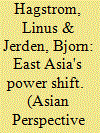

|
|
|
|
|
| Publication |
2014.
|
| Summary/Abstract |
The widespread debate on an East Asian power shift is generally based on the crude notion that power and capability are interchangeable. We critique this view and offer the alternative that power is the capacity of actors and discourses to produce effects- what we call relational and productive power, respectively. We also engage in a reflexive exercise by addressing the productive power of the power-shift debate itself, and emphasize the danger that this debate might enable the kind of realpolitik that it forebodes.
|
|
|
|
|
|
|
|
|
|
|
|
|
|
|
|
| 2 |
ID:
133967
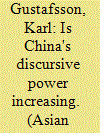

|
|
|
|
|
| Publication |
2014.
|
| Summary/Abstract |
The idea that China's rise, and more specifically its increased material capabilities, are about to produce a power shift in East Asia raises the question whether the Chinese government's ability to produce effects through discursive power has also increased. The government's use of discourses about China's war against Japan is a conspicuous example of attempts to exercise discursive power. Has China's ability to use the past for political purposes increased as its material capabilities have grown? To answer this question, I theorize on the use of discourses about the past on three levels-domestic, bilateral, and international. My analysis demonstrates that notwithstanding its increased material capabilities, the Chinese government's discursive power has actually decreased.
|
|
|
|
|
|
|
|
|
|
|
|
|
|
|
|
| 3 |
ID:
133968
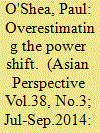

|
|
|
|
|
| Publication |
2014.
|
| Summary/Abstract |
In 2009 the Democratic Party of Japan came to power promising a foreign policy shift, aiming for a more equal relationship with the United States and improved relations with Japan's Asian neighbors. The policy shift was explicitly designed as a response to a perceived regional and global power shift from the United States to China. However, within nine months the new prime minister, Hatoyama Yukio, resigned, and his successors jettisoned the foreign policy shift. Conventional explanations cite the weak leadership of Hatoyama, the inexperience of his party, and the lack of realism behind the proposed policy shift itself as key factors in the shift's failure. In this article I provide an alternative perspective. Drawing on the concept of discursive power, I demonstrate how Washington turned the Futenma base relocation and other issues into a major crisis in Japan-US relations in order to discredit Hatoyama and the policy shift. What was arguably a modest and pragmatic policy shift was narrated as a grave threat to the very cornerstone of postwar Japanese security. By focusing on the US exercise of discursive power over Japan, I suggest that talk of an East Asian power shift is premature.
|
|
|
|
|
|
|
|
|
|
|
|
|
|
|
|
| 4 |
ID:
133966
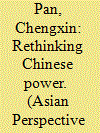

|
|
|
|
|
| Publication |
2014.
|
| Summary/Abstract |
A growing body of literature has focused on an alleged "power shift" from the United States to China (and from the West to the East more generally). For all its complexities and nuances, much of this power-shift literature continues to unreflectively hold onto a conventional way of conceptualizing power as a type of quantitatively measurable and zero-sum property possessed by the state. Without critically engaging with the conceptual question of what power means, however, the power-shift debate is both inadequate and misleading. Drawing on some alternative ways of conceptualizing power, I aim to illustrate the contingent and socially constructed nature of "Chinese" economic power and, in doing so, problematize the widely held view of a US-China power shift. I contend that insofar as power is socially constructed, how it is conceptualized matters for international relations. The need to rethink power is at the core of building a new type of major power relationship.
|
|
|
|
|
|
|
|
|
|
|
|
|
|
|
|
| 5 |
ID:
133969


|
|
|
|
|
| Publication |
2014.
|
| Summary/Abstract |
In this article I join the debate on Japan's soft power and cultural diplomacy. Most of the current scholarship focuses on Japan's agency and implies that through a skillfully crafted policy that utilizes its cultural resources, Japan can enhance its soft power. I question the utility of this agent-based approach. I suggest that cultural diplomacy is not simply a matter of diplomatic craftsmanship; it reflects discursively constructed national identities that, to a large degree, are shaped by international ideational structures. Applying this framework to modern Japan's cultural diplomacy, I argue that postwar Japan's incorporation into the Western camp, and the subsequent identity transformations, have precluded the emergence of a strategic definition of Japan's culture and hence constrained Japan's cultural diplomacy.
|
|
|
|
|
|
|
|
|
|
|
|
|
|
|
|
| 6 |
ID:
133965
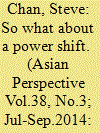

|
|
|
|
|
| Publication |
2014.
|
| Summary/Abstract |
In this article I consider the general idea of power shifts, with specific reference to the discourse on "China's rise." I raise theoretical and policy concerns about the nature, sources, and consequences of China's reemergence as a regional power, and call attention to some analytic tendencies and implicit assumptions featured in this discourse.
|
|
|
|
|
|
|
|
|
|
|
|
|
|
|
|
|
|
|
|
|